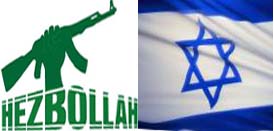Hezbollah-Israel prisoners exchange benefits us
 Gaza City - The Palestinian militant group Hamas said Friday it would "benefit" from Israel's prisoners exchange with Lebanon's Hezbollah movement, suggesting the deal had strengthened its negotiating position regarding an Israeli soldier it is holding captive in Gaza.
Gaza City - The Palestinian militant group Hamas said Friday it would "benefit" from Israel's prisoners exchange with Lebanon's Hezbollah movement, suggesting the deal had strengthened its negotiating position regarding an Israeli soldier it is holding captive in Gaza.
"Hamas will benefit from the release (by Israel to Lebanon) of prisoners with blood on their hands and this will help Hamas reach a similar deal," Khalil Hayeh, a senior Hamas leader in Gaza, said.
He also called for the appointment of an international mediator to speed up the indirect negotiations between Israel and Hamas, similar to the German official appointed by the United Nations, Gerhard Conrad, who brokered the Israel-Hezbollah deal.
"There should be role for a mediator in completing this deal," Hayeh told the Hamas-run Palestinian Information Centre website.
However, he added that "the issue is not the mediator, but the Zionist enemy."
Currently, Egypt is leading the indirect negotiations between Israel and the radical Islamic movement ruling Gaza on a prisoners exchange that would include Israeli Corporal Gilad Shalit.
Hamas and militants of two other groups snatched Shalit by digging a tunnel under the Gaza-Israel border and attacking an Israeli military outpost near the Strip two years ago.
The movement is demanding at least 450 Palestinian prisoners in exchange for Shalit, including several Hamas militants, senior Fatah leader Marwan Barghouti, and Popular Front for the Liberation of Palestine (PFLP) chief Ahmed Saadat.
Barghouti is serving five life sentences for his indirect role in the killing of four Israelis and a Greek Orthodox monk by Fatah gunmen answering to him, while the PFLP under Saadat assassinated an Israeli cabinet minister in October 2001.
Israel has in the past refused to release Palestinian prisoners with "blood on their hands," militants whose attacks against Israelis resulted in deaths or injuries. But in Wednesday's controversial exchange with Hezbollah, it freed convicted Lebanese killer Samir Kuntar and four guerillas of the radical Shiite Lebanese movement in return for the bodies of two Israeli soldiers.
Another Hamas official told Israel Radio Friday that if Israel was serious in its negotiations, it and his movement could close a deal on 70 to 80 per cent of the demanded number of Palestinian prisoners.
According to the official, Israel had thus far agreed to free only 70 of the prisoners appearing on the list submitted by Hamas via Egypt.
The official was dissatisfied with the Egyptian mediator, the radio said, saying he had not been as active as the German mediator who brokered the deal between Israel and Hezbollah.
Both Hayeh and the Hamas official who spoke to Israel Radio on condition of anonymity, said their movement had decided henceforth to keep the negotiations on Shalit's release a secret and away from the media glare, following Hezbollah's example.
"We learned from the Hezbollah deal," Hayeh said. "I hope we can achieve a deal as soon as possible if the Occupation (Israel) accepts our conditions and our demands."
Israeli and Hamas representatives are expected to travel separately to Egypt next week to pick up the indirect negotiations. (dpa)